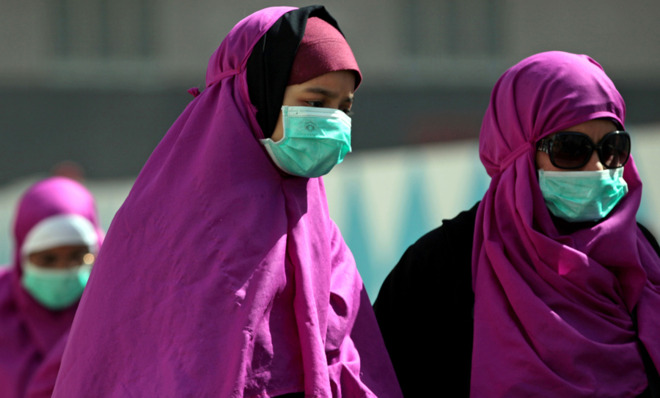A scary new disease just got scarier
The news from Saudi Arabia makes MERS look even worse

A free daily email with the biggest news stories of the day – and the best features from TheWeek.com
You are now subscribed
Your newsletter sign-up was successful

People who study infectious diseases have long been calling for better communication among governments around the world and better monitoring of the spread of diseases within individual countries. Last week, the world got another example of what they are so worried about.
The Ministry of Health in Saudi Arabia announced last Tuesday that it was updating the statistics on Middle East Respiratory Syndrome, a contagious flu-like disease that can be passed from person to person. The disease, a type of corona virus, is commonly abbreviated among infectious disease experts as MERS-CoV and is from the same family as the deadly Severe Acute Respiratory Syndrome (SARS) virus that emerged in China in 2002.
Public health officials were already worried about MERS, because it has an incubation period estimated to be at least several days long, which means an exposed person could travel halfway around the world before evidence of the infection became apparent. They were also worried because the mortality rate among those infected was around one in three.
The Week
Escape your echo chamber. Get the facts behind the news, plus analysis from multiple perspectives.

Sign up for The Week's Free Newsletters
From our morning news briefing to a weekly Good News Newsletter, get the best of The Week delivered directly to your inbox.
From our morning news briefing to a weekly Good News Newsletter, get the best of The Week delivered directly to your inbox.
The news from Saudi Arabia makes the virus look even worse. First of all, the health ministry had under-reported the number of infections identified since January 2013 by more than 100. The total rose to 688 from 575. More worrisome is that the mortality rate jumped to over 40 percent, even while the outcome for more than 50 patients is still unknown. By contrast, the mortality rate for SARS was 9.6 percent.
The announcement came just one day after Saudi Arabia's health minister, without explanation, fired the doctor who was leading the country's efforts against MERS.
In a press release the Health Ministry said that the previously undisclosed cases were uncovered in an internal review, the results of which are driving a number of changes to its policies and procedures.
"The Ministry has already put in place a number of measures to ensure that best practices of data gathering, reporting, and transparency are being strictly observed, and that the necessary systems and processes have been put in place to ensure that from now on, case information will be accurate, reliable, and timely," the release said.
A free daily email with the biggest news stories of the day – and the best features from TheWeek.com
Dr. Tariq Madani, head of the Scientific Advisory Board within the Ministry's Command and Control Center said, "The Ministry is committed to fully understanding MERS-CoV and putting in place the policies needed to protect public health and safety. To do this the Ministry has reviewed historical cases of MERS-CoV to give a more comprehensive understanding of the facts. While the review has resulted in higher total number of previously unreported cases, we still see a decline in the number of new cases reported over the past few weeks."
Still, public health officials such as the World Health Organization warn, "Our understanding of the virus and the disease it causes is continuing to evolve." If there is any good news about MERS, it's that it is not considered easily transmissible.
"This virus has spread from ill people to others through close contact, such as caring for or living with an infected person," according to the Centers for Disease Control. "However, there is no evidence of sustained spreading in community settings."
That said, those are the same conditions under which SARS was found to spread, according to the Centers for Disease Control. SARS eventually spread to 17 countries between November 2002 and July 2003, infecting an estimated 8,273 people and killing 775.
In the hardest hit countries, the human toll was accompanied by significant economic damage. By some estimates the SARS outbreak shaved as much as a full percentage point off of GDP growth in China during its worst year.
At this point, only two MERS cases have been identified in the U.S. Both patients survived.
More from The Fiscal Times...
-
 ‘Those rights don’t exist to protect criminals’
‘Those rights don’t exist to protect criminals’Instant Opinion Opinion, comment and editorials of the day
-
 Key Bangladesh election returns old guard to power
Key Bangladesh election returns old guard to powerSpeed Read The Bangladesh Nationalist Party claimed a decisive victory
-
 Judge blocks Hegseth from punishing Kelly over video
Judge blocks Hegseth from punishing Kelly over videoSpeed Read Defense Secretary Pete Hegseth pushed for the senator to be demoted over a video in which he reminds military officials they should refuse illegal orders